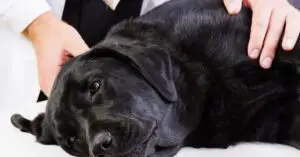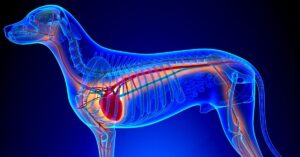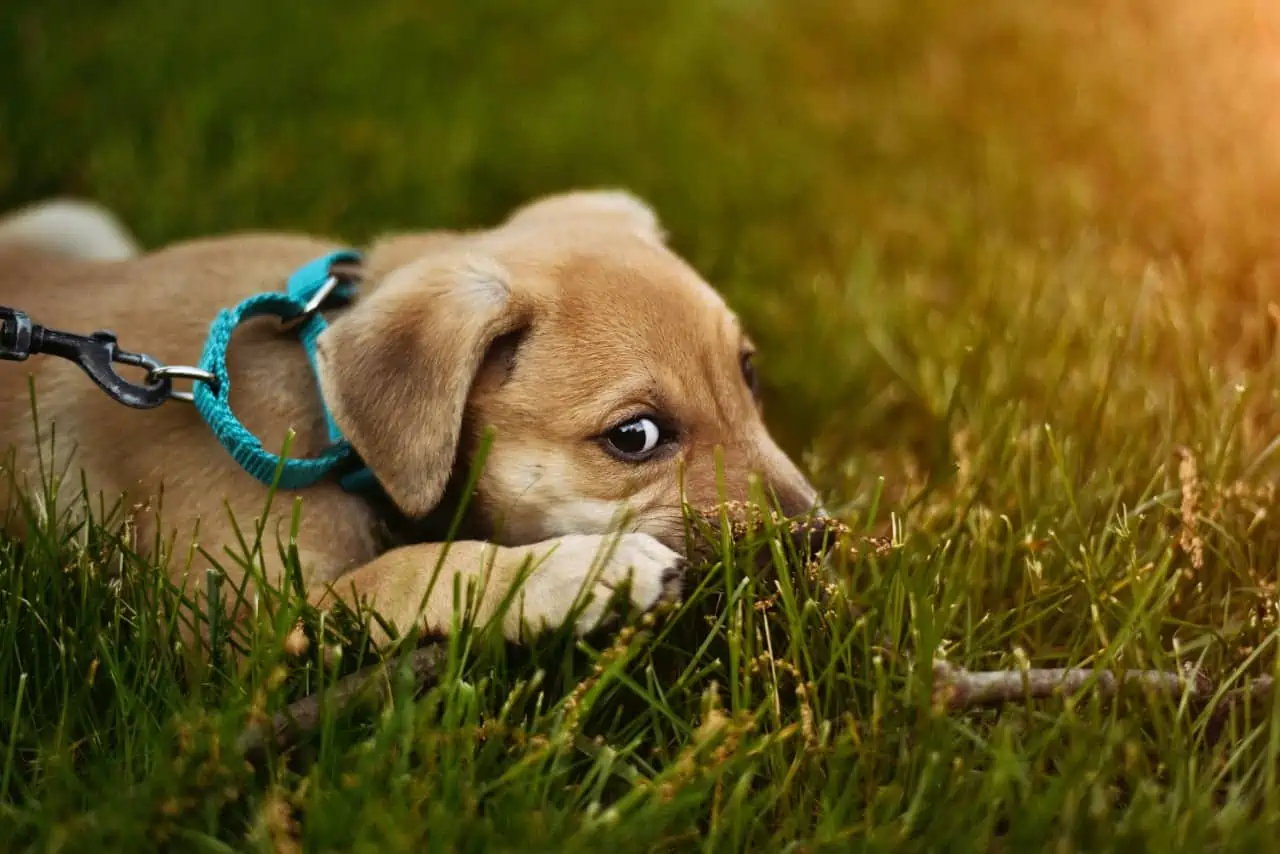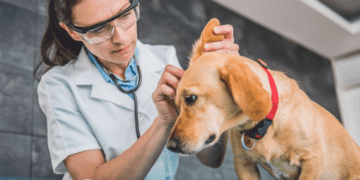Hey everyone!!! Welcome to our new log where today we will be looking at the possible reasons why your dog might have been panting at night. So, let’s start.
Dog panting is a common behavior. However when they do this at night it could mean the pooch is possibly stressed, is afraid of something, in pain or is suffering from a medical condition. Panting at night is often a precursor to something serious and hence professional care is a must. But how do you know for sure what’s causing these reactions????
To understand this better here’s a breakdown of everything related to dog panting. Thus make sure to read until the very end.
Table of Contents
Why do dogs pant?
Unlike humans, dogs don’t have sweat glands and hence their method of sweating is very different from ours. Their bodies are specifically made to release accumulated toxins from their paw pads and through panting.
Thus, every time they pant they release hot air following it up with a deep inhalation of cool air. This method helps them eventually cool down by bringing down their body temperature through the process of evaporation. Dogs pant when they are trying to cool down, exhausted, during walks and even after a good physical or mental workout.
Therefore, if your dog is panting, there’s nothing to be worried about, unless the action is rather frequent, happens at weird timings, or if there are other secondary symptoms linking to the possibility of a medical condition. In such cases you will be required to consult with a vet as soon as possible, as delaying it might make the situation even worse.
Why is my dog panting at night?
Although panting at night can be common if the indoor climate is too hot or stuffy, there are various other factors which could be contributing to the cause. These include:
-
Heatstroke
Heatstroke in dogs is a veterinary emergency and the pooch needs professional treatment as soon as possible. While it happens mostly during the daytime, some dog breeds may still be susceptible to the health issue during summer nights, predominantly due to insufficient ventilation or lack of access to fresh water.
The pooch will become severely lethargic, pant excessively, lay flat, and may even collapse, when kept ignored for a long time. The only solution here will be to administer them with IV fluids as soon as possible as heatstroke can be fatal.
-
Stress
The next common reason behind panting at night may also be due to heightened stress in the animal. Changes in their natural environment, feeding schedules or sleeping spots are typically stressful to most pooches which they may exhibit through panting. This in turn initiates the production of more and more Cortisol, therefore adding to their discomfort.
Other symptoms include wide-open eyes, a restless look, hiding, or pacing from one spot to another. A stressed canine should be handled carefully and slowly as going too fast can stress them out even more.
-
Pain
In case your pooch had recently suffered a physical trauma, the pain can serve as an added factor behind the weird behavior. As the reaction is generally accompanied by elevated heart rate and respiratory rate, it might be your dog’s way of meeting the sudden increase in its bodily demands.
Pain can be due to both external as well as internal factors, like an organ injury. Thus even though you can’t find a visible wound on their body, don’t rule out the possibility and consult with a doctor instantly. Depending upon the severity of the cause, the woofer may require an emergency surgical procedure as treatment.
-
Anxiety and Fear
Just like stress, an anxious or afraid dog is also prone to panting heavily at night. With fear comes hyperactive senses, and that means the little ones will require more than usual energy and oxygen to keep them going. Apart from panting, they might also tuck their tails between their legs, cower in fear, hide, run away, whine, bark, or start trembling.
Be extra careful when you approach such a dog. Given their circumstances, they can snap out or exhibit aggression, as a form of self-defense.
-
Anemia
A medical condition that needs special care, Anemic dogs often end up panting at night due to insufficient oxygen production in their body. With all the muscles relaxing the production of oxygen dips even lower, requiring them to pant for more air.
This condition puts tremendous pressure on their already weak blood cells, risking their organs functionality and leading to much more severe symptoms. So, if you have an anemic dog, getting them proper and regular treatment is a must for their quality of life.
-
Cushing’s Disease
Another one of the serious medical risks, Cushing’s disease mostly prevails in older dogs, although heredity, endocrine disorders or tumors on the pituitary and adrenal glands can also be the cause behind its occurrence in younger pups. In this condition, their body produces higher amounts of Cortisol, automatically increasing their stress and anxiety levels. This in turn increases the probability of a heart attack, tumor, bad seizures, and even collapsing.
Other secondary telltale signs and symptoms include an abnormally bloated belly, frequent feeling of thirst, irritation and hunger. When diagnosed at the right time, this health issue is treatable, therefore timing is very crucial in this case.
-
Cognitive Dysfunction
Mostly prevalent in older dogs, cognitive dysfunction is a dementia-like health disorder that slowly affects the brain and neural senses. This impacts the dog’s general behavior, making them do weird things, including pacing back and forth, panting at night, and even losing motor function at some times.
Unfortunately, there’s no cure available for this condition. But pet owners can consult with a vet and invest in proper treatment options to reduce the side-effects.
-
Heart Diseases
Heart diseases are also one of the leading factors behind excessive panting at night. Due to the malfunctioning organ, fluids may swell up in the lungs along with insufficient oxygenation of the blood, leading to severe cough, pneumonia, lethargy and high fever.
The cause behind heart diseases could range from the presence of heartworms to arrhythmias, valve disorders, cardiomyopathies, etc. These symptoms require surgical care and thus should be instantly reported to a professional.
-
Certain Medications
Now while medications are designed for the betterment of dogs, some pooches may show an adverse reaction to some of the components or to the whole drug in general. For instance, prednisone and steroid drugs are often related to panting at night. So, if that’s the case, you might want to consult your doctor and have a substitute administered in case of the previous medication.
What needs to be done during these episodes? (Vet Recommended)
Well, first of all you will need to try and find out the pain point and remove the canine from the stressful factor. For instance, if the dog is panting excessively at night due to fireworks or thunderstorms, it is better to close all windows and doors, and turn on white noise. You can also veil the curtains to help them focus more on what’s going inside rather than being terrified of the loud bangs and jittery lights outside.
However, if the cause seems something else, you must:
- Consult with a vet right away or take the pooch to the vet clinic.
- Have every necessary test done to properly track the underlying cause.
- Follow the treatment procedures appropriately and without any fail.
- Keep the dog away from the stressful factor or anything that might add on to their health deterioration.
- Stop any medications that may be causing the effect, but only on the vet’s advice.
Always remember that panting at night could be a telltale sign for something serious and hence without experimenting on your fur baby’s life, follow the vet’s directions as strictly as possible.
You may also like:
Dog Keeps Shaking Head | Should I be Worried?
If you are a dog lover then, Subscribe to our weekly newsletters. No Spams!





![Best Dog Insurance Options for Blue Roans 2023 [UK]](https://spanieldogs.com/wp-content/uploads/2023/05/Best-Dog-Insurance-Options-for-Blue-Roans-2023-UK-350x250.jpg)






![Best Dog Insurance Options for Blue Roans 2023 [UK]](https://spanieldogs.com/wp-content/uploads/2023/05/Best-Dog-Insurance-Options-for-Blue-Roans-2023-UK-120x86.jpg)

